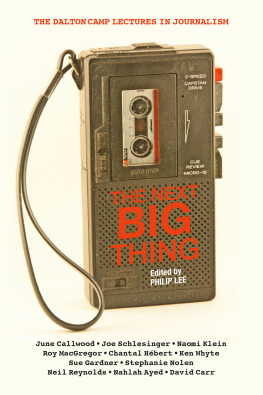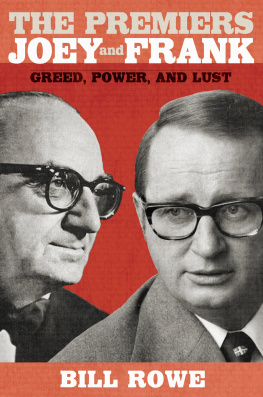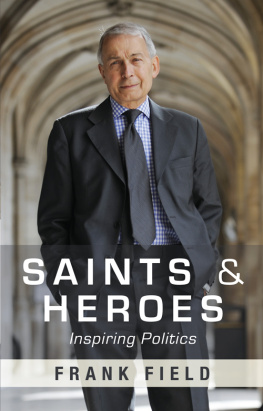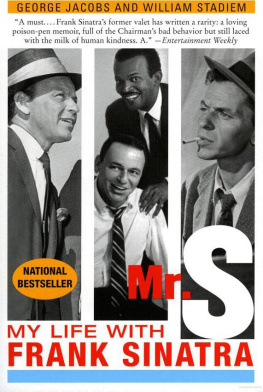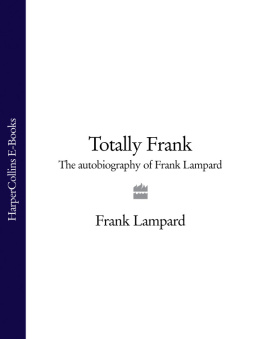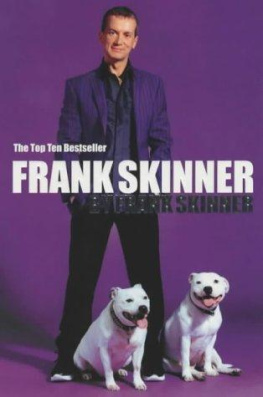FRANK
THE LIFE AND POLITICS OF
FRANK MCKENNA

Election night, 1991.
FRANK
THE LIFE AND POLITICS OF
FRANK MCKENNA
PHILIP LEE

The Publisher gratefully acknowledges the financial contributions of several Canadian businesses, without whose support this book would not have been possible.
Copyright Philip Lee, 2001.
All rights reserved. No part of this work may be reproduced or used in any form or by any means, electronic or mechanical, including photocopying, recording, or any retrieval system, without the prior written permission of the publisher. Any requests for photocopying of any part of this book should be directed in writing to the Canadian Copyright Licensing Agency.
Edited by Laurel Boone.
Book design by Ryan Astle.
Printed in Canada by Friesens.
10 9 8 7 6 5 4 3 2 1
Canadian Cataloguing in Publication Data
Lee, Philip J., 1963
Frank : the life and politics of Frank McKenna
Issued also in French under title: Frank: la vie et la politique de Frank McKenna
Includes bibliographical references and index.
ISBN 0-86492-303-1
1. McKenna, Frank J. 2. Prime ministers New Brunswick Biography. 3. New Brunswick Politics and government 1987
I. Title
FC2477.1.M34L44 2001 971.5'104'092 C2002-901728-6
F1043.M32L44 2001
Published with the financial support of the Canada Council for the Arts, the Government of Canada through the Book Publishing Industry Development Program, and the New Brunswick Culture and Sports Secretariat.
Goose Lane Editions
469 King Street
Fredericton, New Brunswick
CANADA E3B 1E5
For Fernand Landry
CONTENTS
ACKNOWLEDGMENTS
I am grateful to the many people who generously contributed to this project, in particular the staff at the Provincial Archives for endlessly hauling boxes and retrieving files, Francis McGuire for sharing his time and personal records, Donald Savoie for offering his wisdom, research and early manuscript of his Frank McKenna project, Aldea Landry for her graciousness during a difficult time, Scott Anderson for his friendship and support, Peter Dale and Elizabeth Dingman for offering me a home in Toronto, Jackie Webster for giving me the use of her screened porch at Youghall Beach, my mother Roberta Lee for reading and editing the manuscript, and Ruth McCrea, who was marvellous and indispensable in every way. For assistance in assembling photographs, I am grateful to Harry Mullin; to Howie Trainor, of the New Brunswick Telegraph-Journal; to Bill Witcomb and Tracy Carr, of the Fredericton Daily Gleaner; and to Anne-Marie Beaton, of Canadian Press. Susanne Alexander of Goose Lane Editions patiently shepherded this project from conception to completion.
I am indebted to the patience, good humour and candid co-operation of Frank and Julie McKenna, their children and other members of the McKenna clan. Frank and Julie McKenna sat for many hours of interviews and contributed their personal papers and photographs to this project. The story could not have been told without the work of two researchers. Emelie Hubert spent hours in archives and libraries, doggedly compiling essential files, in particular tracing the genealogy of the McKennas. Deborah Nobes, a fine journalist and writer, conducted essential interviews, collected documents and critiqued the manuscript; every page reflects her indomitable spirit and enthusiasm. Finally, the book belongs to the three people who lived it with me, Danielle, Gabrielle and Aaron, children of my heart.
Public life is regarded as the crown of a career, and to young men it is the worthiest ambition. Politics is still the greatest and the most honourable adventure.
John Bucban, Lord Tweedsmuir
Your name is Francis. There was never a St. Frank. Thats a name for gangsters and politicians.
Frank McCourt

Frank McKenna in Wilmot Park, Fredericton, 1993.
1
BAY STREET BLUES
If you move, youre a target. But I wont stand still.
Frank McKenna, diary entry, September 16, 1996
He opens his front door and steps out into the awakening city. He pauses to button his navy trench coat and stretch the morning stiffness out of his legs, then crosses the street and cuts through the park. A gentle spring rain splashes on the pathway in front of him. Other early risers carry umbrellas and walk their dogs across wet grass that is beginning to turn green as winter releases Toronto from its embrace. The subway station that serves the moneyed neighbourhood of Rosedale is just ahead, but he prefers a forty-minute walk to a ten-minute ride, even in the rain. He turns right on Yonge Street, picking up his pace as the pulse of the city quickens with each passing block. If Francis Joseph McKenna moved any faster, hed break into a jog. His best days begin when hes up early and out walking.
Early morning walks have been one of McKennas rituals for years. When he was Premier of New Brunswick, he left his white clapboard home in Fredericton at six-thirty on weekday mornings and walked beside the St. John River to his office near the provinces legislative building complex. Navigating the bustling sidewalks of Toronto, Frank McKenna carries himself in much the same manner as he did on the sleepy streets of Fredericton. His brown eyes are bright and alert; his body bristles with energy. He doesnt need coffee in the morning to clear his head.
He has notes to himself stuffed in his pockets eat right, exercise, be optimistic, be decisive, call home the scribbled reminders of a man who must be disciplined in all things. His to-do lists are a bulwark against the pace of his life. He is sucked easily into the vortex of work until he is whirling so fast that he loses sight of the kind of man he aspires to be. And so he reminds himself listen more than you speak, take time out to think, dont forget your family. When he loses control and forgets about his lists, he feels a measure of failure as he walks back home at the end of the day.
He diets constantly to keep the pounds off his stocky five-foot-eightinch frame, notes his weight in his diary each day, and periodically subjects himself to three-day fasts to cleanse his system. He plays golf now instead of hockey, but he still carries hard muscle on his shoulders, arms and thick hands, his body forever defined by the hayfields he worked as a boy on his familys farm in Apohaqui, New Brunswick.
He is still consumed by the incessant drive that propelled a boy with big dreams out of a life of poverty and rural isolation. When a man moves so quickly from there to here, parts of the character he has fashioned on the journey are only sketched in. Therefore Frank McKenna remains elusive. When you think you have him standing in front of you, he slips away again. He has always been the fastest man on the street.
He rarely follows the same route downtown, leaving Yonge Street to avoid waiting at traffic lights, pausing to pour a fistful of change into the hands of every panhandler he meets. Back home, New Brunswickers watch Frank McKennas every move. Here in Toronto he is anonymous, just another man in a hurry, on his way to make his fortune on Bay Street. At the corner of Bay and King Street East, he stops and looks up at the three imposing Toronto Dominion Bank office towers. Welcome to the heart of capitalist greed, he says with a smile. Then, still speaking with the proprietorship of a premier, he notes, If I had just one of these buildings in New Brunswick, Id have zero unemployment. He turns abruptly and pushes through a revolving door into the sprawling lobby of First Canadian Place.
Next page

